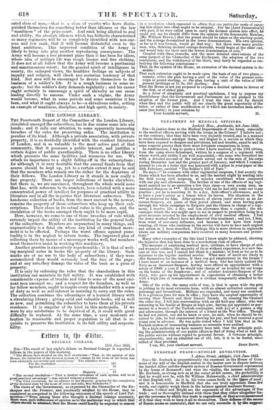PRACTICAL JOKING IN THE ARMY.
THE general order of Lord Hardinge in the case of the Ennis- killens at Canterbury is an illustration of the new rule that is to prevail in the social regulation of the Army. The actors in scenes of practical joking are absolutely interdicted ; those who encourage them openly are cast under a ban ; indulgence is shown to young men who are placed in a difficult position ; and honest men who try to prevent such scenes are encouraged, even when they make mis- takes in the execution of their duty. Cornet Evans, the chief ac- tor, is cashiered ; Lieutenant Webster, who encouraged the jokes and tried to prevent the .prevention of the duel, is ordered to sell out ; Cornet Hartopp is placed under a species of disgrace ; Cornet Baumgarten is admonished to read the Articles of War that forbid duelling, and to be more cautious in future ; Sergeant Brodie is commended for endeavouring to prevent the duel, though advised that it would have been better if he had applied to his su- perior officer. In the fate of Webster, officers will learn that there is to be some equality between man and man in the army ; that distinctions of rank do not override the higher distinctions of moral conduct and fidelity to the spirit of the service. It is re- marked that Captain Fitzwygram, who is said to have been at the bottom of these irregularities, is not mentioned. Possibly he may be the subject of a separate order. Nothing of the kind, however, has yet appeared; and it must be remembered that clever men can do mischief without appearing themselves as responsible actors. Roguery of that kind can always render others its cats- paw ; and the only punishment awaiting it, where it is carried out with great adroitness, is the feeling of dislike occasioned by seeing the most culpable escape when others are punished.
If, however, no set rule will reach such clever fellows, the healthier atmosphere introduced into the Army, by a faithful carrying out of the established law, is likely to prove un- suitable to their health and comfort. It is quite evident,
that if Lord Hardinge's regimen be executed, as it seems like- ly to be from recent instances, it will be impossible for an officer to live in comfort unless he observe the discipline of the Army. We must couple this enforcement of law with the new plan for the examination of candidates, and the evident com- mencement of the custom, of promoting men for their zeal and ability. The tendency is to admit into the Army a better-eda- (sated class of men,—that it a class of youths-who have distin- guished themselves for something better than idleness or the low "manliness" of the prize-court. And rank being allotted to zeal and ability, the absolute idleness which has hitherto characterized so many regiments will be so completely identified with non-suc- cess and low rank, that it will become distasteful even to the least ambitious. This improved condition of the Army is likely to bring into play another reproducing consequence. The Army will become a less pleasant place than it has been for idlers, whose idea of military life was rough licence and fine clothing. It does not at all follow that the Army will become a puritanical and sanctimonious resort; for the general spirit of intelligence in society, the enlarged views, the healthier feelings on subjects of inquiry and religion, will cheek any sectarian tendency of that kind. But men will be encouraged to devote themselves to the business of a soldier's life. It is a rough business in some re- spects ; but the soldier's duty demands regularity ; and his career aught certainly to encourage a spirit of chivalry as one cause leading directly to success. Under such a regime, the Army would become, what in some periods and some countries it has been, and what it ought always to be—a chivalrous order, setting an example of manliness, discipline, and high spirit, to society.



























 Previous page
Previous page